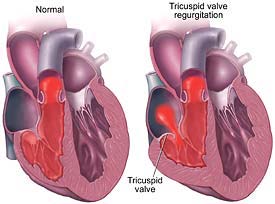Tricuspid Regurgitation: Symptoms, Causes & Treatment
As you may know, I had heart valve replacement due to a narrow and leaky bicuspid aortic valve that suffered from calcified valve leaflets. I knew about my defective heart valve since the time I was 5 years old. That said, my condition was considered a congenital heart condition. I had a heart murmur for the first 33 years of my life. I say "had" because, since my surgery a few years ago, I no longer have a heart murmur or any symptoms.

After launching this website, I began meeting patients with other forms of heart valve disease. More specifically, I started to connect with patients who suffered from tricuspid regurgitation, which is a common form of heart valve disease. While regurgitation can impact each of the heart valves, it is most common in the mitral and tricuspid valves.
Depending on the severity of the disease, tricuspid regurgitation can ultimately lead to either tricuspid valve repair or tricuspid valve replacement surgery.
About Tricuspid Regurgitation
Tricuspid regurgitation (also known as tricuspid incompetence, tricuspid insufficiency) is leakage of blood backward through the tricuspid valve each time the right ventricle contracts. As the right ventricle contracts to pump blood forward to the lungs, some blood leaks backward into the right atrium, increasing the volume of blood, resulting in less blood being pumped through the heart and, ultimately, to rest of the body.
As a result, the right atrium enlarges, and blood pressure increases in the right atrium. The liver may swell because of this increased pressure. Heart enlargement (dilation) of the right atrium also can result in atrial fibrillation, a rapid, irregular heartbeat.
Eventually, tricuspid regurgitation can result in heart failure. If you are just starting to learn about heart disease, I posted a human heart diagram to help you understand the anatomy of the heart.
Tricuspid Regurgitation Causes
The causes of tricuspid regurgitation can be attributed to a number of different causes.
Causes of tricuspid regurgitation include:
- Heart valve infection (bacterial endocarditis)
- Birth defects of the tricuspid valve (congenital heart disorders)
- Injury
- Myxomatous degeneration (a hereditary disorder in which the valve gradually becomes floppy).
Symptoms of Tricuspid Regurgitation
According to the Cleveland Clinic, some of the most common symptoms of tricuspid regurgitation include:
- Shortness of breath, especially with exertion or when you lie down
- Fatigue, especially during times of increased activity
- Cough, especially at night or when lying down
- Heart palpitations
- Swollen feet or ankles
- Chest pain (angina) or tightness
- Dizziness
Tricuspid Regurgitation Treatment
As for the treatment of tricuspid regurgitation, usually mild tricuspid regurgitation requires little or no treatment. Surgery to repair or replace the tricuspid valve is rarely done unless surgery on another heart valve (for example, the mitral valve) is also needed. However, this is not always the case. Depending on the severity of the backflow of blood, cardiac surgery may be required.
To help you learn more about the treatment of tricuspid valve disease, which is sometimes referred to as the "forgotten valve", I met with Dr. Patrick McCarthy, the Executive Director of the Bluhm Cardiovascular Institute at Northwestern Memorial Hospital. Dr. McCarthy has performed over 10,000 cardiac procedures and specializes in tricuspid valve operations.
You Might Also Like
To help you learn more about tricuspid regurgitation and its treatment, you may like:
- Tricuspid Valve Repair
- Tricuspid Valve Replacement
- Echocardiograms & Heart Valve Disease
- Heart Valve Anatomy
- The "Forgotten" Tricuspid Valve Gets Transcatheter Love
- Clinical Trial Update: TRILUMINATE Launches to Evaluate TriClip
- Meet Tricuspid Valve Patients in Our Community
Page last updated: September 18, 2020




